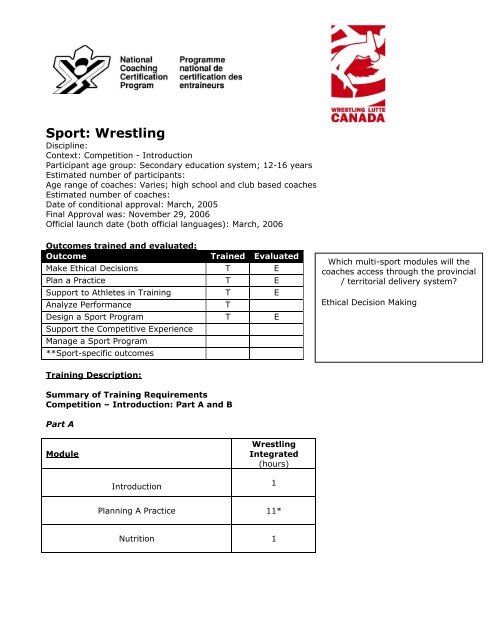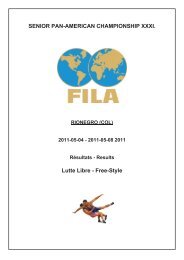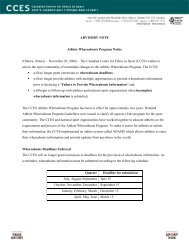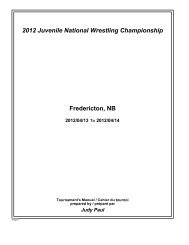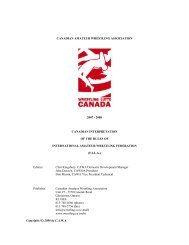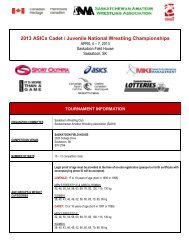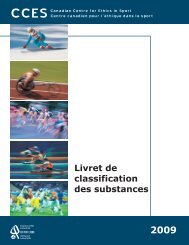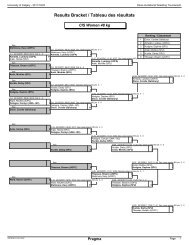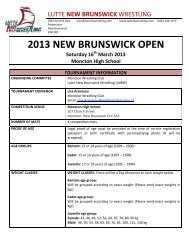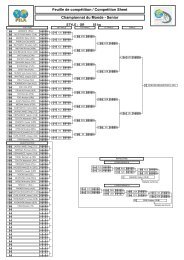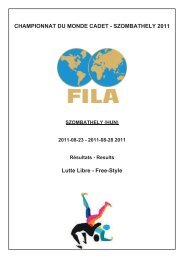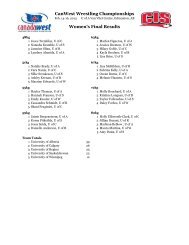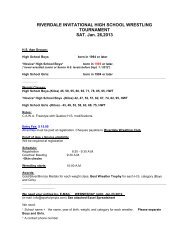New NCCP Wrestling Competition-Introduction: Program Overview
New NCCP Wrestling Competition-Introduction: Program Overview
New NCCP Wrestling Competition-Introduction: Program Overview
You also want an ePaper? Increase the reach of your titles
YUMPU automatically turns print PDFs into web optimized ePapers that Google loves.
Sport: <strong>Wrestling</strong><br />
Discipline:<br />
Context: <strong>Competition</strong> - <strong>Introduction</strong><br />
Participant age group: Secondary education system; 12-16 years<br />
Estimated number of participants:<br />
Age range of coaches: Varies; high school and club based coaches<br />
Estimated number of coaches:<br />
Date of conditional approval: March, 2005<br />
Final Approval was: November 29, 2006<br />
Official launch date (both official languages): March, 2006<br />
Outcomes trained and evaluated:<br />
Outcome Trained Evaluated<br />
Make Ethical Decisions T E<br />
Plan a Practice T E<br />
Support to Athletes in Training T E<br />
Analyze Performance<br />
T<br />
Design a Sport <strong>Program</strong> T E<br />
Support the Competitive Experience<br />
Manage a Sport <strong>Program</strong><br />
**Sport-specific outcomes<br />
Which multi-sport modules will the<br />
coaches access through the provincial<br />
/ territorial delivery system<br />
Ethical Decision Making<br />
Training Description:<br />
Summary of Training Requirements<br />
<strong>Competition</strong> – <strong>Introduction</strong>: Part A and B<br />
Part A<br />
Module<br />
<strong>Wrestling</strong><br />
Integrated<br />
(hours)<br />
<strong>Introduction</strong><br />
1<br />
Planning A Practice 11*<br />
Nutrition 1
Ethical Coaching 3<br />
Total 16<br />
* Includes 6 hours <strong>Wrestling</strong> CanCoach L-1<br />
Part B<br />
Module<br />
Designing A Basic Sport <strong>Program</strong><br />
<strong>Wrestling</strong><br />
Integrated<br />
(hours)<br />
4<br />
Teaching and Learning 13*<br />
Basic Mental Skills 3<br />
Total 20<br />
* Includes 7 hours <strong>Wrestling</strong> CanCoach L-2<br />
The <strong>NCCP</strong> <strong>Wrestling</strong> (Integrated) Part A is a 16 hour workshop and includes modules dealing with:<br />
<strong>Introduction</strong> to Coaching; Planning A Practice; Nutritional Advice; and Ethical Coaching. The<br />
National Coaching Certification Technical Guide Part A Technical content is integrated into the<br />
workshop. The <strong>NCCP</strong> <strong>Wrestling</strong> (Integrated) Part B is a 20 hour workshop and includes modules<br />
dealing with: Designing A Basic Sport <strong>Program</strong>; Teaching and Learning; and Teaching Basic<br />
Mental Skills. The National Coaching Certification Technical Guide Part B Technical content is<br />
integrated into the workshop. Upon completion of a module the coach is considered “trained” for<br />
that given module.<br />
Professional development opportunities – Coaches will have access to opportunities to further<br />
their coach education through mentorship with more advance educated experienced coaches (i.e.<br />
national team training camps) and through attendance at additional coach workshops. Coaches<br />
may also access PD opportunities by enrolling in CPR, first aid and/or sport therapy courses<br />
offered provincially. One area CAWA has brought into the fold of professional development is the<br />
requirement of coaches to complete a pre/during/post competition plan addressing some of the<br />
aspects of supporting athletes in competition.<br />
Evaluation Description:<br />
The CAWA has developed “Evaluation Standards and Process” necessary for the coach to move<br />
from “Trained” status to “Certified” status. The CAWA evaluation standards include evaluation in:<br />
Making Ethical Decisions and Providing Support To Athletes In Training (as required by the<br />
Coaching Association of Canada); and Planning A Practice and Designing A Basic Sport <strong>Program</strong><br />
(as selected by CAWA). Evaluation in the Providing Support To Athletes In Training requires<br />
observation of the coach in a practice environment.
The CAWA has selected and trained a core of Master Evaluators to work with Evaluators on a<br />
regional basis to ensure coaches in all provinces have an opportunity to move from trained to<br />
certified status by completing the evaluation process.<br />
The new <strong>NCCP</strong> recognizes competency gained by prior learning and experience. Coaches may<br />
move directly to the certification phase provided they go through the evaluation process and<br />
demonstrate their ability to adequately achieve the outcomes for each context.<br />
Maintenance of certification in the new program will include a professional development<br />
component. Your original certification is in effect for a five-year period (Starting 2004) The<br />
Canadian Amateur <strong>Wrestling</strong> Association and the Coaching Association of Canada are in the<br />
process of finalizing appropriate activities to be considered as professional development.<br />
Learning Facilitator & Evaluator training:<br />
LEARNING FACILITATORS<br />
• Facilitator selection and training – In September 2004 Master Learning Facilitator training<br />
was conducted with representatives from each province (1-3 people/province depending on<br />
size). This mass training session was held at no cost to the participant. Individuals<br />
selected to participate in the MLF training included course conductors from the old <strong>NCCP</strong><br />
system who also possessed the identified qualities of MLFs. Supplementary funding was<br />
then made available to each province to conduct provincial learning facilitator training in<br />
order to meet the demand of that specific region. LF training within each province will<br />
continue as needed to meet the demand for coach training. It has been strongly<br />
recommended that a ‘buddy’ approach be utilized in both the training of MLFs and LFs.<br />
After an individual has been trained as a LF the individual will ‘buddy up’ with a more<br />
experienced LF to co-deliver a Comp – Int workshops. This co-delivery method should<br />
continue until the LF is comfortable to deliver the workshop solo.<br />
• Facilitator recruitment – It will be the responsibility of the individual provinces/territories to<br />
recruit and train enough qualified LFs to deliver the Comp –Int workshop as needed to<br />
meet the demand for coach training. It will be recommended to the PTOs that they only<br />
train an adequate number of facilitators to meet the demand, rather than training an over<br />
abundance of LFs creating minimal stress on human resources and to ensure LFs deliver an<br />
adequate number of workshops annually.<br />
• Facilitator currency – CAWA recommends that accredited LFs deliver at least two Comp–Int<br />
workshops per year in order to stay current within the larger, active provinces. The<br />
delivery of at least one Comp-Int workshop per year is recommended for smaller, less<br />
populated provinces/territories.<br />
• Meeting future facilitator demands – Again, the PTOs will be responsible to recruit and train<br />
an adequate number of LFs to meet the demand for coach training within their respective<br />
regions. For the remote areas of the country where the sport is still growing, CAWA may<br />
opt to provide supplementary funding to those regions to offset the costs associated with<br />
bringing a LF into the region from an active centre or bringing coaches from the remote<br />
regions in to an active centre.<br />
Note: CAWA will be participating in the <strong>NCCP</strong> School Coach Certification initiative as one of four<br />
pilot sports. In participating in this pilot project we will be able to identify new LFs, generally<br />
teachers, within the school system and also ensure, through this partnership, that the integrated<br />
<strong>Competition</strong> – <strong>Introduction</strong> training for wrestling is made available to the targeted participant<br />
group. This should also address some of the challenges associated with rural delivery.<br />
EVALUATORS<br />
• Qualified individuals were identified within each province (1-3/province dependent on size)<br />
to take part in master evaluator training in conjunction with two championship events.
These trained master evaluators will be working within their respective provinces to<br />
identify and train qualified individuals to become provincial evaluators.<br />
Individuals selected to become evaluators are recommended to have the following<br />
qualities:<br />
- Course conductor or evaluator in the old <strong>NCCP</strong><br />
- Strong technical knowledge in the sport of wrestling<br />
- Minimum <strong>NCCP</strong> level 2 certified<br />
- Background in teaching<br />
It has been strongly recommended that a ‘buddy’ approach be utilized in the training of<br />
evaluators. After an individual has been trained as an evaluator the individual will ‘buddy<br />
up’ with a more experienced evaluator to co-deliver a Comp – Int coach evaluation. The<br />
co-delivery method should continue until the evaluator is comfortable to administer a<br />
coach evaluation solo.<br />
• Evaluator currency – CAWA recommends that accredited evaluators conduct a minimum of<br />
two coach evaluations per year in order to stay current within the larger, active provinces.<br />
The delivery of at least one coach evaluation per year is recommended for smaller, less<br />
populated provinces/territories.<br />
• Evaluator consistency – Ensured through standardized evaluation package and training.<br />
NSF Contact Information<br />
Clint Kingsbury<br />
Domestic Development Manager<br />
ckingsbury@wrestling.ca<br />
(613) 748-5686<br />
3 most innovative features of your program:<br />
1. Recognizes prior learning and allows coaches to enter the<br />
evaluation process directly should they feel confident in their current<br />
abilities.<br />
2. Provides coaches with an interactive CD-ROM including all the<br />
technical sport specific elements within the sport.<br />
3. Enables a club or LF to adjust the delivery structure (i.e. deliver<br />
the content in a weekend format or break it into evening learning<br />
sessions) to best accommodate the community.
OUTCOME CRITERIA Multi-sport<br />
module<br />
Make Ethical Decisions • Be able to demonstrate fair play,<br />
positive routines & habits, critical<br />
thinking and supervision skills.<br />
• Reflect on the importance of<br />
behaving respectfully toward<br />
participants, officials, parents, and<br />
spectators.<br />
• Identify key issues in a common<br />
situation that can be encountered in<br />
the context of your coaching<br />
environment.<br />
• Describe a course of action for<br />
dealing with this situation that is<br />
consistent with the values and<br />
philosophy of the <strong>NCCP</strong>.<br />
Plan a Practice<br />
• Choose from a bank of pre-designed<br />
activities suitable for age group.<br />
• Set appropriate structure for<br />
practice.<br />
• Identify risk factors and verify that<br />
facility and equipment pose no risk.<br />
• Develop EAP.<br />
• Make good use of available time and<br />
equipment.<br />
• Identify suitable objective(s) for the<br />
practice.<br />
• Incorporate appropriate means and<br />
methods to achieve particular<br />
training effects.<br />
• Be able to adapt practice for an<br />
individual as required.<br />
Design a Sport <strong>Program</strong> • Over a period of 8 to 12 weeks,<br />
establish a sound progression of<br />
practices for the development of<br />
skills and some athletic abilities for<br />
wrestlers competing at local and<br />
provincial levels.<br />
• Work with wrestlers to set goals and<br />
success indicators.<br />
• Develop a one year planning chart<br />
that incorporates seasonal<br />
segments of 8-12 weeks.<br />
• Understand basic & advanced<br />
control positions<br />
• Open<br />
• Wrist,<br />
• Double Biceps,<br />
• Collar & Inside Elbow<br />
Integration<br />
• Two-on-one<br />
• Overhook & Far Wrist<br />
• Underbook & Far Wrist<br />
• Headlock<br />
• Be able to incorporate the<br />
CANCoach Level 1 & Level 2 core<br />
techniques into the complete<br />
practice program.
Takedown Technique<br />
• Double Leg<br />
• Inside Single Leg (High Crotch)<br />
• Outside Single Leg<br />
• Fireman’s Carry<br />
• Shoulder Throw<br />
Analyze Performance<br />
Provide Support to<br />
Athletes in Training<br />
Support the Competitive<br />
Experience<br />
Groundwork Technique<br />
• High Gut Wrench<br />
• Cross Ankle Tilt<br />
• Arm Bar Series (Chicken Wing,<br />
Half Nelson)<br />
• Leg Ride<br />
• Crossface Series<br />
• Identify the basic athletic abilities<br />
required for performance in<br />
wrestling.<br />
• Assess the status of the wrestler vs.<br />
basic skills and tactics needed for<br />
performance at this level<br />
• Identify appropriate corrective<br />
measures.<br />
• Communicate the result of the<br />
analysis to wrestler.<br />
• Verify that facilities and equipment<br />
pose no safety risks.<br />
• Deliver one session aimed at<br />
improving the basic technical<br />
abilities of wrestlers competing at<br />
either the local and/or provincial<br />
level, in a way that is consistent<br />
with the guidelines set for the age<br />
group, and that promotes selfesteem.<br />
• Adapt the activity for individual or<br />
group needs and abilities.<br />
• Apply basic teaching principles for<br />
explanation and demonstration of<br />
skills and techniques.<br />
• Provide feedback to wrestlers<br />
regarding their performance.<br />
• Influence team harmony positively.<br />
• Apply basic psychological skills of<br />
self awareness, relaxation<br />
techniques.<br />
• Be able to identify dysfunctional<br />
behavior.<br />
• Be able to communicate in an<br />
effective manner; verbal, nonverbal,<br />
listening, intervention,<br />
feedback.<br />
• Communicate basic pre-competition<br />
nutritional strategies to the<br />
wrestlers and their parents.<br />
• Design appropriate competitive<br />
warm-up activities.<br />
• Teach basic mental skills to promote<br />
concentration and manage stress.


